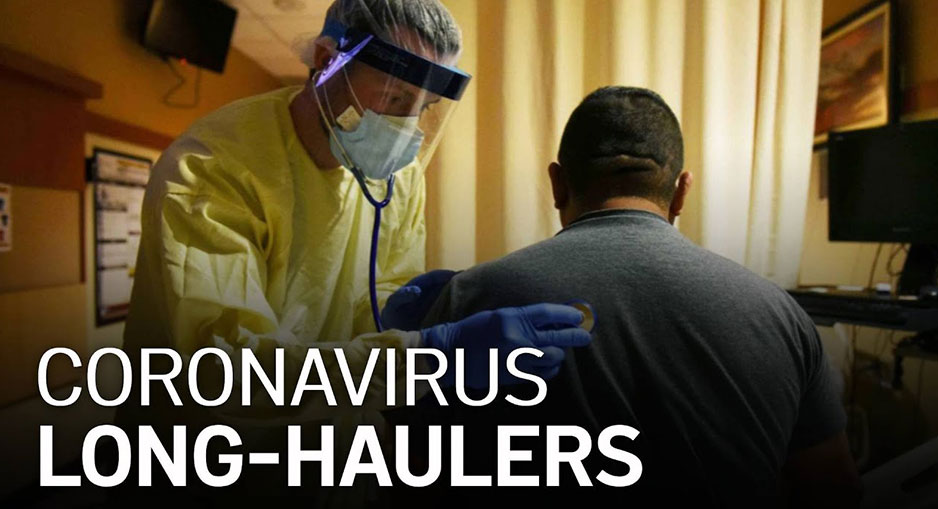Who are the Long Haulers?

In the ever-evolving story of coronavirus (COVID-19), specialists have now found that some people could experience symptoms of the disease many weeks or even months after having it. According to one report, most people fall into one of 2 groups when it comes to the virus. About 80 percent of those with COVID-19 end up having a mild reaction and most of those cases resolve in about 2 weeks. For people who have a severe response to the virus, it could take between 3 and 6 weeks to heal.
But now, there is growing concern over a different group of people who do not seem to fall into either of those 2 categories. One study states that about 10 percent of people who have had COVID-19 will experience long-term symptoms 1, 2, or even 3 months after they were infected. One of the most frustrating parts? There seems to be no consistent reason for this to occur.
This group, which many refer to as “long haulers,” is mixed with those who underwent both mild and severe cases. And this condition could affect anyone – young, old, those who were healthy, those who had a chronic condition, those who were hospitalized, and those who were not.
“We are now seeing patients whose symptoms seem to continue for some time,” says family medicine provider Doctor Christopher Babiuch, MD. “This is challenging because everyone’s requirements are so unique. We are finding that collaborating as a team between separate specialists helps to manage and support these patients, but there’s a lot that we are still learning.”
What is the average age of a long hauler?
At this point, we cannot determine the average age or predict who may have prolonged symptoms. There is a mix of relativity young, healthy people who we are seeing in this long-term group as well as older people. Hospitals are still working to examine the data about this group and a lot of collaboration and research is happening.
Do most long-haulers have hidden or chronic medical conditions?
We believe so, but it is still too early to be certain. Our experience shows that the majority of long-haulers tend to fall into the high-risk category, but there is also a growing percentage of people who were otherwise healthy before they became infected. From what we know so far, it still seems random as to who experiences these continuing symptoms and who does not.
What symptoms do covid long haulers generally experience?
Long-lasting symptoms usually include coughing, tightness in the chest, shortness of breath, headaches, muscle aches, and diarrhea. But it may be the most important symptom that is being seen across the board in coronavirus long haulers is fatigue. Many times this group feels much run down and tired. They cannot exert themselves or exercise and simple tasks (such as walking to the mailbox) will usually leave them feeling exhausted. Chronic fatigue like we are seeing in this group could be incredibly debilitating and frustrating. Many long haulers also report brain fog, difficultly focusing, or the feeling that they are not as sharp as they used to be.
Are covid long haulers still contagious?
It is not very likely, but it is a sticky question to answer. Generally, after having an active infection like COVID-19, the contagiousness goes away after a week or so and you begin to heal. We less commonly see continuous fevers in this group, which hints that they probably are not infectious months later, but it could vary. The vast majority of long haulers test negative for COVID-19, despite persistent symptoms. We define a long hauler as still having some sort of symptom 28 days or later after they first became infected.
Why some people are experiencing prolonged symptoms and others are not?
We know that COVID-19 starts an inflammatory response in the body, which could cause a chain of events with many different symptoms and outcomes. Unfortunately at this time, more research requires to be done to help us explain why this could lead to long-term symptoms in some people. In the future, we will be able to tell the full prolonged effects that COVID-19 has on the kidneys, lungs, and heart, but we just are not there yet.
If a person develops symptoms several months after having tested positive for COVID-19 (or if they believed they had it in the past), what should they do?
If someone tested positive (or believes that they were infected) at least 28 days ago and is still experiencing symptoms they should contact their doctor or primary care physician.
How are healthcare providers treating and managing covid long-haulers?
Many health systems are beginning to streamline care for this group of patients. Long haulers must go through testing involving behavioral, pulmonary, respiratory, cardiovascular, and neurological health. From there a care path and treatment are suggested and a team of providers will observe the patient moving forward. It is also crucial to drink fluids to stay hydrated, rest, concentrate on sleep, manage stress, and eat well.
There is a lot of collaboration and research happening as more data is collected and we begin to piece together the prolonged effects of COVID-19 on the body. The team is there to discover symptoms that worsen and get them to the right level of care. We are also seeing that depression and anxiety are big problems for these long haulers, so checking in to see how they are doing is another crucial aspect of the monitoring program.
Should long haulers still get the COVID-19 vaccine?
The Centers for Disease Control and Prevention (CDC) has suggested that the vaccines should not be withheld from those who have been previously infected with COVID-19, regardless of being symptomatic or asymptomatic. If you have tested positive for the virus (or believe you had it), you will require to wait 10 days or till you are no longer showing symptoms to receive the vaccine.
If you or anyone you know is suffering from post covid syndrome, our expert providers at Post Covid Centers will take care of your health and help you recover.
Call 469-545-9983 to book a telehealth appointment for a home check-up.
Post Covid Syndrome vs. Fatigue
While COVID-19 is a short-lived disease in most people, others experien...
Post Covid Syndrome vs. Skin Weakness Problems
A new study illustrates that some patients with COVID-19 disease have continuous skin-associated symptoms...
RELATED BLOGS
